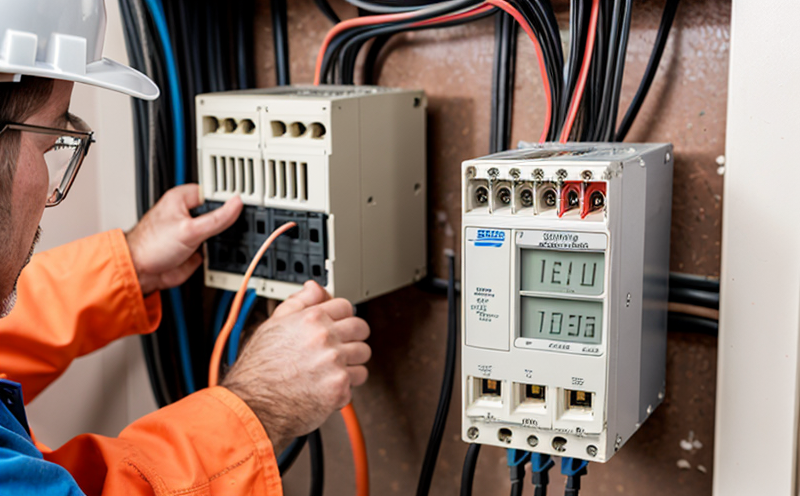
-
Electrical and Electromagnetic Testing-
Electrical Reliability Testing-
Evaluating Electrical System Integrity over Time
We provide comprehensive solutions designed to help our clients mitigate risks, enhance performance, and excel in key areas such as quality, health & safety, environmental sustainability, and social responsibility.
Discover
For many years, our organization has been operating successfully, boasting modern laboratories that meet international standards. These laboratories are equipped with the latest technology devices and equipment, and we have built a strong team of experienced and trained personnel to operate them.
DiscoverWelcome to Eurolab, your partner in pioneering solutions that encompass every facet of life. We are committed to delivering comprehensive Assurance, Testing, Inspection, and Certification services, empowering our global clientele with the ultimate confidence in their products and processes.
Discover
-
Electrical and Electromagnetic Testing-
Electrical Reliability Testing-
Evaluating Electrical System Integrity over TimeEvaluating electrical system integrity over time is a critical aspect of ensuring the safe and efficient operation of electrical systems in buildings, facilities, and industrial settings. Electrical systems are often subject to wear and tear, degradation, and aging, which can compromise their performance, safety, and reliability. Regular evaluation and maintenance of electrical systems are essential to prevent equipment failures, reduce downtime, and minimize the risk of electrical shock or fires.
Factors Affecting Electrical System Integrity
Several factors contribute to the degradation of electrical system integrity over time. These include:
Check wiring and connections for signs of wear, damage, or corrosion.
Verify that all wiring is properly secured to avoid loose connections.
Inspect busbars and equipment for signs of overheating or excessive wear.
Use multimeters to measure voltage, current, and resistance in electrical systems.
Test circuit breakers, fuses, and switches to ensure they function correctly.
Verify that all electrical equipment is properly grounded to prevent shock or fires.
Check overhead wiring for signs of wear, damage, or corrosion.
Verify that all overhead wiring is properly secured to avoid loose connections.
Inspect circuit breakers and fuses in overhead wiring to ensure they function correctly.
Common Electrical System Hazards
Here are some common electrical system hazards you should be aware of:
The typical lifespan of electrical equipment varies depending on usage, quality, and environmental conditions.
2. How often should I inspect my electrical system?
Inspect your electrical system at least once a year to ensure its safety and reliability.
3. What are some common signs of electrical system degradation?
Look for signs of wear, damage, or corrosion on wiring, connections, and equipment.
Additional Considerations
Here are some additional considerations when evaluating electrical system integrity:

Military Equipment Standards
Military Equipment Standards: Ensuring Effectiveness and Safety The use of military equipment is a ...

Electromechanical Safety Certification
Electromechanical Safety Certification: Ensuring Compliance and Protecting Lives In todays intercon...

Cosmetic Product Testing
The Complex World of Cosmetic Product Testing The cosmetics industry is a multi-billion-dollar ma...

Industrial Equipment Certification
Industrial equipment certification is a critical process that ensures industrial equipment meets spe...

Agricultural Equipment Certification
Agricultural equipment certification is a process that ensures agricultural machinery meets specific...

Pressure Vessels and Installations Testing
Pressure Vessels and Installations Testing Pressure vessels are a critical component of various ind...

Environmental Impact Assessment
Environmental Impact Assessment: A Comprehensive Guide Environmental Impact Assessment (EIA) is a c...

Transportation and Logistics Certification
Transportation and Logistics Certification: A Comprehensive Guide The transportation and logistics ...

Energy and Sustainability Standards
In today’s rapidly evolving world, businesses face increasing pressure to meet global energy a...

IT and Data Center Certification
IT and Data Center Certification: Understanding the Importance and Benefits The field of Informatio...

Healthcare and Medical Devices
The Evolution of Healthcare and Medical Devices: Trends, Innovations, and Challenges The healthcare...

Battery Testing and Safety
Battery Testing and Safety: A Comprehensive Guide As technology continues to advance, battery-power...

Chemical Safety and Certification
Chemical safety and certification are critical in ensuring the safe management of products and proce...

Aviation and Aerospace Testing
Aviation and Aerospace Testing: Ensuring Safety and Efficiency The aviation and aerospace industr...

Environmental Simulation Testing
Environmental Simulation Testing: A Comprehensive Guide In todays world, where technology is rapidl...

Food Safety and Testing
Food Safety and Testing: Ensuring the Quality of Our Food As consumers, we expect our food to be sa...

Automotive Compliance and Certification
Automotive Compliance and Certification: Ensuring Safety and Efficiency The automotive industry is ...

Consumer Product Safety
Consumer Product Safety: Protecting Consumers from Harmful Products As a consumer, you have the rig...

Renewable Energy Testing and Standards
Renewable Energy Testing and Standards: Ensuring a Sustainable Future The world is rapidly transiti...

MDR Testing and Compliance
MDR Testing and Compliance: A Comprehensive Guide The Medical Device Regulation (MDR) is a comprehe...

Trade and Government Regulations
Trade and government regulations play a vital role in shaping the global economy. These regulations ...

Hospitality and Tourism Certification
Hospitality and Tourism Certification: Unlocking Opportunities in the Industry The hospitality and ...

Electrical and Electromagnetic Testing
Electrical and Electromagnetic Testing: A Comprehensive Guide Introduction Electrical and electrom...

Fire Safety and Prevention Standards
Fire Safety and Prevention Standards: Protecting Lives and Property Fire safety and prevention stan...

Lighting and Optical Device Testing
Lighting and Optical Device Testing: Ensuring Performance and Safety Lighting and optical devices a...

NEBS and Telecommunication Standards
Network Equipment Building System (NEBS) and Telecommunication Standards The Network Equipment Bu...

Railway Industry Compliance
Railway Industry Compliance: Ensuring Safety and Efficiency The railway industry is a critical comp...

Pharmaceutical Compliance
Pharmaceutical compliance refers to the adherence of pharmaceutical companies and organizations to l...

Product and Retail Standards
Product and Retail Standards: Ensuring Quality and Safety for Consumers In todays competitive marke...

Construction and Engineering Compliance
Construction and Engineering Compliance: Ensuring Safety, Quality, and Regulatory Adherence In the ...